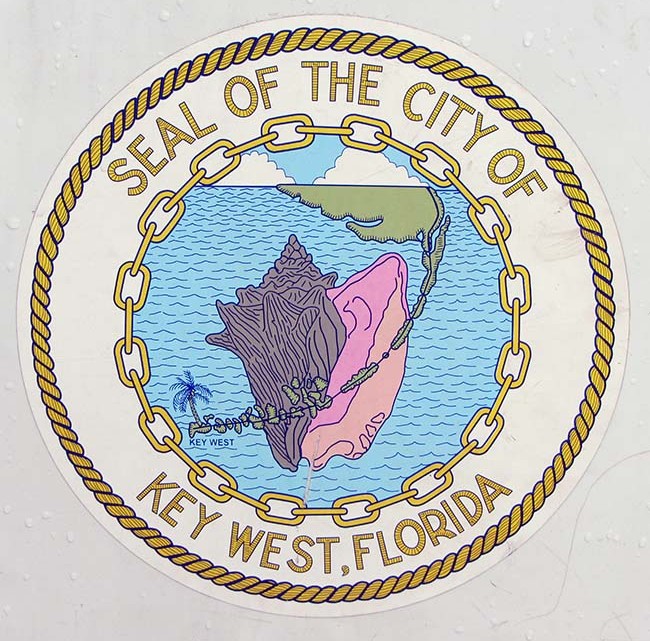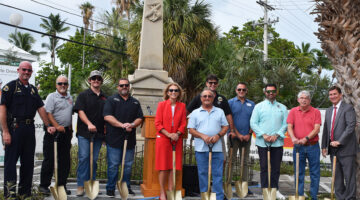New Admiral’s Cut opening option considered
BY PRU SOWERS
KONK LIFE STAFF WRITER
Key West City Commissioners are pushing ahead to find a solution to bridging Admiral’s Cut, a privately-owned, 45-foot-wide gap in the pedestrian walkway between Mallory Square and Truman Waterfront Park, that has bedeviled city officials for 15 years.
The gap, currently a strip of water that is used for small watercraft storage, stops pedestrians from easily accessing two of the city’s major public amenities, Mallory Square and the new Truman Park. And it is affecting the city’s plans to renovate Mallory Square, according to Mayor Teri Johnston, who, along with the other commissioners, expressed frustration at the Nov. 6 commission meeting over the stalemate.
As a result, City Attorney Shawn Smith was directed to draw up a timeline for the process of eminent domain, where the city would ask a judge to grant an easement along Admiral’s Cut, owned by the Margaritaville Key West Resort and Marina, for a public use bridge. And Johnston floated a new incentive to convince Margaritaville to voluntarily share the Cut: moving the location of a proposed new restaurant slated for Mallory Square that Margaritaville has objected to.
Margaritaville and the previous owner of the resort property, Westin Hotels, have both complained about the proposed restaurant, which would be located adjacent to the waterfront hotel on the western corner of Mallory Square. The resort has its own in-house restaurant, Bistro 245, which currently enjoys a monopoly on waterfront eating options along that side of Mallory Square.
Those complaints have stalled the restaurant project for over nine years, resulting in the developer, Tropical Soup, Inc., which owns several other Key West restaurants, to make multiple changes to the design in order to appease both the hotel owner and city planning officials. The most recent restaurant design won city commission approval and then-City Manager Jim Scholl was directed in June to begin final contract negotiations with Tropical Soup.
However, those negotiations appear stalled again and Johnston’s idea to move the restaurant location away from Margaritaville to another spot on Mallory Square could cause a further long delay in the development. Johnston acknowledged that Tropical Soup owner Joe Walsh has spent “thousands and thousands of dollars in the last nine and a half years” on making changes to the restaurant design.
“There are tons of options out there. I can’t believe in 15 years we are in the same spot,” Johnston said. “We have control over Mallory Square.”
“That sounds like a simple solution. You could move it [restaurant] over,” agreed Commissioner Billy Wardlow. “I think that would be the easiest if they would agree to that.”
But moving the location of the proposed restaurant would defeat the original goals of the project, which were to allow commercial development of that particular corner of the Square in return for hundreds of thousands of dollars in rental payments to the city and the restoration of the two historic cable huts that are located in that corner. The dilapidated cable huts are considered historic structures in Key West; the first built in 1921 and the second in 1930 to store the telephone cables that were laid in in the early 1920’s and opened communication between Cuba and the mainland for the first time. The huts are a resource listed in the National Register of Historic Places.
Walsh’s proposal would restore one of the cable huts and build a Mallory Square historical museum in the adjacent “hospitality hut.” He has also agreed to make rent payments to the city totaling $303,000 a year or seven percent of his gross sales, whichever was greater.
Walsh did not return a request for comment from Konk Life on his reaction to the possibility of moving the restaurant to another location at Mallory Square. But city attorney Smith said between the two options of a costly, lengthy court case for eminent domain and moving the restaurant location, the latter might be easier.
“If your idea now is to approach [Walsh] about perhaps a different location on the site, lessening the impact to the adjoining neighbors, perhaps that is an issue,” he said.
In other city news, it looks like state legislators are moving ahead to stop Key West from implementing a ban on the sale of sunscreen products containing ingredients believed to harm coral reefs. Key West passed the ban in 2018 but delayed implementation until state lawmakers could rule on the legality of local authorities banning the widely-sold products. Now, a bill in both the state House and Senate prohibiting the Key West ban have passed in committee and are on their way to be considered in the full legislative session, which begins in January.
“It seems to be moving,” city manager Veliz told commissioners at the Nov. 6 meeting about overturning the local sunscreen ban. “As [the bills] hit the floor of both the whole Senate and House, there will be other arguments made and try to get some grandfather clause added. But, as of now, the [bill] sponsors didn’t want to hear it.”
The reason bill sponsors say they are attempting to overturn Key West’s ban is that multiple studies gaging the impact of some sunscreen ingredients on the health of coral reefs are not “definitive.” That is the exact same argument several sunscreen manufacturers made to Key West commissioners when they were debating the local ban last year.
[livemarket market_name="KONK Life LiveMarket" limit=3 category=“” show_signup=0 show_more=0]




No Comment